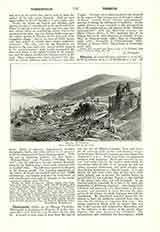

Tiberius, the second Roman emperor (A.D. 14-37), b. November 16, 42 B.C.; d. March 16, A.D. 37. He was the son of Tiberius Claudius Nero and Livia. By the marriage of his mother with Emperor Augustus he became the latter’s stepson, and was adopted by Augustus in A.D. 4. In the year 10 he was appointed coregent with Augustus. Hard and secretive by nature and embittered by the neglect with which his step-father allowed him to be treated, he did not arouse personal enthusiasm, and until recently was described by historians as a bloody tyrant. It is only during the last sixty years that he has been more fairly judged, and at present the opinion begins to prevail that he was a genuine Roman, a ruler faithful to his duties, just, wise, and self-contained. In his internal policies especially he is one of the most distinguished of all Roman emperors. Like Augustus he reformed and improved every department of the government, and promoted in every direction the prosperity of the empire of which Augustus had laid the foundation. He developed imperial power by declining to have his authority renewed from time to time by the Senate, as Augustus had done. The strong opposition which grew up against him was due to his taciturn and domineering disposition, and to the influence of the prefect of the guard, Aelius Sejanus, who alone possessed his confidence. The persecutions and executions for lese-majesty, which rapidly increased during the second half of his reign, and the gloom which pervaded Rome induced Tiberius to leave the capital altogether in the year 26 and to live partly in Campania and partly on the Island of Capri. Before this date the question as to the succession to the empire had led to a terrible family tragedy. By his first marriage Tiberius had a son called Drusus, while his second marriage with theimmoral Julia, daughter of Augustus, was childless. After the death of his nephew Germanicus (A.D. 19), whom he had been obliged to adopt at the command of Augustus to the exclusion of his own son, he hoped to secure the succession for Drusus. A low intrigue was formed against this plan, in which the wife of Drusus, Livilla, who had illicit relations with Sejanus, took part. In the year 23 Drusus was poisoned by Sejanus and Livilla. However, when in 31 Sejanus formed a conspiracy to secure the throne for himself, Tiberius was warned at the last moment and had Sejanus executed. Tiberius spent his last years in constantly increasing seclusion, misanthropy, and cruelty on the Island of Capri, where it is said he abandoned himself to debauchery. However, these reports are at least colored by prejudice and have not been satisfactorily proved. Neither is it probable that Tiberius was murdered.
The ministry and death of John the Baptist and of Jesus Christ occurred during the reign of Tiberius. According to St. Luke (iii, 1), St. John the Baptist was called by God, in the fifteenth year of the reign of Tiberius, to prepare the way for Christ as His precursor. Shortly before his death Tiberius recalled the procurator Pontius Pilate from Judea. Tertullian (Apologeticum, v, xxi), from whom Eusebius and Orosius take the story, relates that Tiberius received a report concerning Christ and that he called upon the Senate to place Christ among the gods. The Senate rejected the request; Tiberius then threatened the accusers of the Christians with punishment. The narrative is not worthy of belief, still it is probable that Tertullian knew a document that professed to be a report of Pilate.
KLEMENS LOFFLER

